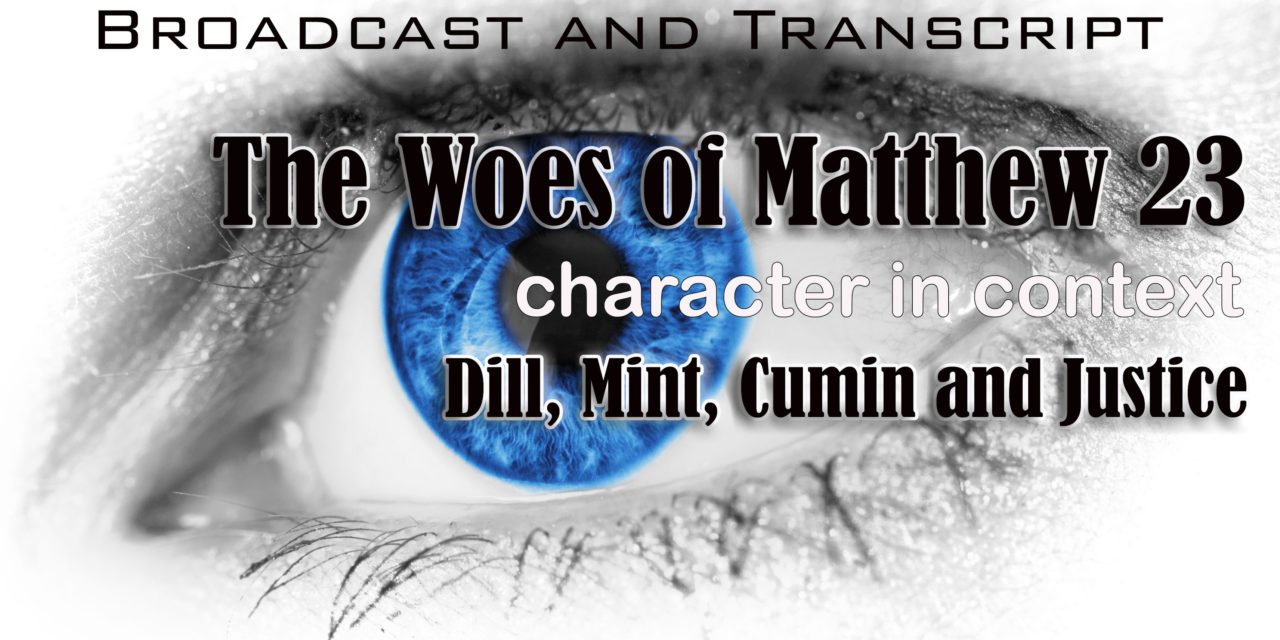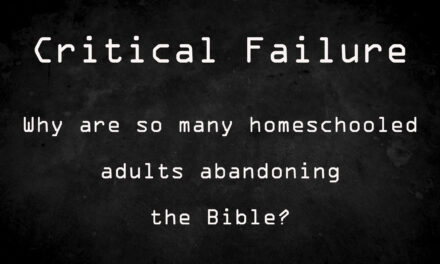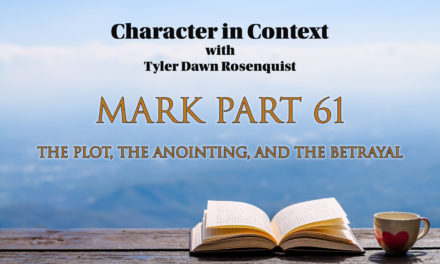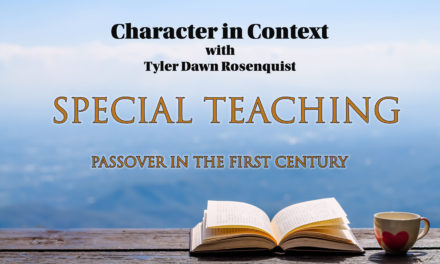Continuing with my series on the “woes” of Matthew 23. This week Yeshua/Jesus gives the Pharisees and Scribes credit where credit is due–they are amazing tithers. But He also rebukes them for missing the bigger picture–just what were the weightier matters of Torah? What did “justice and righteousness” mean in the ancient world?
Transcript below–not really edited
*****************
So, last week I was pretty tough on the Mishnah because Tractates Shevuot and Nedarim have some great example of why Yeshua/Jesus and other first century commentators were just telling folks not to take oaths at all, because of the legalistic ways people would swear without having to be held responsible for it. Like Yeshua said, and I paraphrase, “Just be honest! Let your yes be yes and your no be no, but all this legal wrangling and playing with what the Torah says is evil.” He just didn’t mince words. This week I am going to give credit where credit is due as far as the Mishnah goes because if it wasn’t for the Mishnah tractates dealing with the tithe, the various tithes would be all but impossible to understand from the text itself for the average reader, me included. The Mishnah tells us exactly how the tithes were administered in Biblical times so we will talk about that a bit—as that was not something that Yeshua criticized the Pharisees and Scribes for—but we will also be talking about the incredibly important ancient Near Eastern concept of Mishpat and Tzedakah—justice and righteousness.
Hi, I’m Tyler Dawn Rosenquist and welcome to Character in Context, where we explore the historical context of Scripture and talk about how it bears on our own behavior and witness as image-bearers. You can find my teachings on my websites theancientbridge.com and contextforkids.com as well as on my youtube channels, accessible from my websites. You can also access past broadcasts on my podcast channel characterincontext.podbean.com and my context books for adults and families are available through amazon.com.
So, this is part five of my series on the seven woes of Matthew chapter 23—a very shocking series of condemnations against certain Pharisaic practices, but really boiling down to a condemnation of their leading the people away from Yeshua in their teachings. They were shutting the door to the Kingdom of Heaven in people’s faces and not going in themselves. God gave them popularity and influence with the Jews in the Land and they squandered it on trying to solidify their own power base at the cost of missing the coming of Messiah. Leadership has its privileges, certainly, but it also has grave responsibilities for not only where we lead people to, but what we lead people away from. Of course, not all Pharisees were leading people away from Yeshua, nor were all elders and Scribes, but remember that polemic was about slandering the authority of a philosophical group as a whole, and as Josephus said, Phariseeism was one of the four philosophical movements within Judaism in the first century—philosophy in those days meaning a lifestyle dedicated to leaving behind evil and pursuing good. In those days, people spoke in stereotypes as a rule—what—you didn’t think all Cretans were really liars did you?
Let’s read the fourth woe here. This week we will go back to the TLV, which doesn’t use Pharisees and Scribes but instead Pharisees and Torah scholars. I don’t like this translation because it boxes Scribes in too tightly and not all of them were Torah Scholars, but if you want more of an explanation than that, you can check out the teaching I did on Pharisees and Scribes a few weeks back that is posted on my podcast channel. He probably was narrowly addressing the Scribes who were Torah scholars and teachers among the Pharisees, but not necessarily. Remember that linguistic experts aren’t historical experts and vice versa. No one can know everything. I can’t translate a Bible, so I don’t expect translators to know every little historical tidbit. That’s why we need everyone.
23 “Woe to you, Torah scholars and Pharisees, hypocrites! You tithe mint and dill and cumin, yet you have neglected the weightier matters of Torah—justice and mercy and faithfulness. It is necessary to do these things without neglecting the others. 24 O blind guides, straining out a gnat while swallowing a camel!
First of all—no rebuke for how they choose to tithe. Not one word. In fact, Yeshua tells them that the tithing is necessary. And yet, He labels them blind guides, just like we saw last week when rebuking them over their ridiculously legalistic oath games. So, credit where credit is due, their tithing is above reproach.
BUT. What was the purpose of the tithe? The purpose was threefold—the first was to care for the Levites and Priests, as they had no share in the Land inheritance. When anyone devotes themselves completely to the ministry, as the Levites and Priests were commanded by obligation of birth, the rest of the people were required to take care of them. They didn’t have land to grow their own food on and breed their own flocks on—without support, they would starve, simple as that. The tithe gave everyone the benefit of the Land while freeing up the Levites to work for God full time. Now, remember, all priests were Levites but not all Levites were priests. To be priestly, you had to descend directly from Aaron and his sons. To be a Levite, you only had to be a descendant of Levi the son of Jacob and Leah. There were a ton more Levites than priests, obviously, and there were also more jobs for the Levites. But as the numbers of priests grew, more and more of the levitical jobs got swallowed up by the Priesthood—especially after the exile. Levites were responsible for being shepherds to raise the sacrificial animals, tending olive groves for the oil, wheat fields for the flour for the meal offerings, and vines for the grapes for the wine offerings. The Temple was like a small city and so it took a small army to make it function properly. So, it makes perfect sense that Yeshua would commend them on their handling of the tithe, even in being more generous than the Word required by including “wild” plants like herbs in their giving that were above and beyond what was required. This tithe was called the ma’aser rishon—first tithe. This tithe was given six out of every seven years.
Now, the second function of the tithe was to fuel the celebration week of Sukkot and was called ma’aser sheni, second tithe. In addition to the ten percent given to the priests, a second ten percent was taken either in the form of food or money to Jerusalem and eaten “in the presence of God.” Although it may seem excessive, both tithes were an act of trust that God would sustain them on the rest. And don’t think that the family was required to eat it all themselves because this was also used to feed the poor who came to celebrate. This tithe happened four years out of every seven-year cycle, in the first, second, fourth and fifth year.
The third function of the tithe was to care for the poor. The ma’aser ani, or poor man’s tithe, was given every third and sixth year of the seven-year cycle. Instead of eating like gluttonous pigs for a week during those years, the tithe was placed in the storehouses to be distributed to the poor by the Levites. That would sustain the poor during the intervening years. It was an excellent system.
And yes, if you know tithes you also know about the Terumah, Bikkurim, Levite’s tithe, priest’s tithe, etc but those weren’t an issue here. We’re only concerned with why Yeshua was using this in order to highlight a greater issue.
So, the tithe was there to care for those of limited means, whether it be job-related or poverty-related. So the spirit of the law is to care for those who cannot care for themselves and for those who worked full time for God and who were, therefore, denied other opportunities normal people take for granted. This brings us to the ancient concept of Mishpat and Tzedakah and I have an amazing book to recommend—my copy is in New Mexico with my friend Dinah right now but it was written by Moshe Weinfeld and is called Social Justice in Ancient Israel and the Ancient Near East. It was an eye-opener for me when I read it about four years back with my study group.
When Yeshua told the Pharisees and Scribes that they were neglecting the weightier matters of Justice and Righteousness while going overboard on the optional stuff, he was speaking in terms that the entire ancient world would have understood.
R&J, when the two words appear together in a sentence, is a hendiadys (hen-dee-a-dis)—two words that mean something when used together that is larger than just the meaning of the two words. If I say, “Come inside, it’s nice and warm,” you know that it means something better than simply being warm, which isn’t always pleasant, or nice, which is vague. But nice and warm means COZY. It is a comforting combination. More than just nice and more than just warm. In the same way, righteousness and justice in the ancient world stood for the actions of an ideal King—caring for the widows and orphans, the poor, oppressed, imprisoned, the enslaved, and the sick. Throughout the Hebrew Bible, Israelites were called upon the behave according to this kingly ideal that all the pagan nations around them recognized, without limit, whereas in the pagan nations, a king was expected to perform these actions when he first came to power—which gained him the reputation thereafter of being righteous and just, a champion to the oppressed, etc. regardless of how we behaved afterward. It was what one did when one came to power. Upon ascending the throne, a king would often set free the political prisoners of his predecessor, free slaves, preferentially take the cases of the most vulnerable members of society and punish those who were oppressing them, etc.
One of the most overlooked things about the Torah is that it set up a system of wisdom where God’s people were to always live according to these standards set for newly enthroned kings—even if they weren’t kings, they were to act like it, showing mercy and doing justice toward the vulnerable. When other nations looked at Israel, they were to marvel at their wisdom in dealing with others. Through Israel, God meant to show the world what it meant to love their neighbors full time, and especially the least of these. Many of the laws that don’t make sense today, and even seem oppressive, were put in place in counterpoint to how things were done in the ancient world where you didn’t say no to wartime rape, where a female slave was there for your pleasure, and—well, you get the idea. Torah gave rights and dignity to women, to widows, to the orphaned, to the lame, blind and deaf in a world where they were largely exploited. It only seems harsh to us, living in the shadow of the Cross, after which everything changed. We live in a world where even atheists clamor for justice for the poor, because Christianity changed the world from a very uncaring place, where people only looked out for the members of their immediate family, and maybe their clan when push came to shove against outsiders, into a world where people care about the lost, feed the poor in parts of the world they will never visit, dig wells for people who can’t speak the same language, and build hospitals for people who will never even know their names. The world wasn’t like that when Yeshua came. It takes a long view of history to even begin to understand the impact of His life, death, and resurrection.
And the Pharisees and Scribes, whom Josephus said possessed the most accurate interpretation of Torah—well, they were missing it. They were more concerned with tithing on steroids than with the purpose of tithing, which was to feed the poor. They made tithing about what they were doing or not doing, and if they were tithing properly and which things were tithed on, and all the minutiae of the legalities, while losing sight of the people who needed their help in a time of desperate poverty. The tithing wasn’t about them and all their regulations, it was about providing for people. And those people needed a lot more than food, they needed justice. More than that, there was an entire world of foreigners who needed to know about God’s love, but apart from diaspora Jews making an effort to convert local wealthy patrons (a smart move, btw) and Pharisees converting other Jews to their set of doctrinal beliefs, very few Gentiles were joining the nation. Shammai practically forbade it, and although Hillel welcomed Gentile converts, there is nothing to suggest any formal evangelistic program. The Jews were the Jews and the Gentiles were the Gentiles—but this is the limitation of the written word, and why we needed the Word made flesh.
Throughout His ministry, Yeshua showed His people what God looks like, what His provision and fierce love look like. Instead of preaching about the external minutiae of commandment-keeping, Yeshua talked about living the commandments from the inside out—not just refusing to commit adultery, but not even disrespecting a member of the opposite sex by thinking about them that way. Not just refusing the murder, but to even guard the words spoken to and about others, knowing the damage they can do to a person’s reputation—not to mention the feuds they can start. Not needing oaths because everything you say is supposed to be above reproach. He healed people, every single day of the week, and delivered them from demonic oppression. He never put the externalities of the Law before the needs of real people. He showed what loving one’s neighbor looks like. Torah just said, “Love your neighbor as yourself,” but we all know how easy it is to sidestep how we want to be loved and rationalize hardly caring about someone else while calling it love. Heck, we can even curse someone out of one side of our mouth while calling it “speaking the truth in love.” When left to our own devices, let’s be honest, we do the bare minimum and often we don’t even do that.
The Pharisees and their Scribes dotted every I and crossed every t, kinda, when it came to the legalities of giving, but if that was where their concern ended, then they were just heartlessly keeping rules for the sake of keeping them. And before we say, “Thank you God that I am not like those Pharisees,” well, of course, we are! There are tons of people who claim to be Torah observant (when none of us are, we all pick and choose) yet scream at the thought of doing anything more than what is written. The scary thing is that, with only 613 laws and the majority of those concerning the Temple and Priesthood, there is a whole world of sin not even covered. Sins that, when we internalize the wisdom according to the standard set by Yeshua and enabled by the help of the Spirit, are deplorable to us—but any unbeliever can keep a set of laws, even brutally strict laws. Muslims are often far more diligent about keeping their regulations than believers are about keeping God’s laws. Anyone can do the external without changing one whit on the inside. Look at Paul, keeping the Pharisaic interpretations of the law flawlessly, by his own admission, and yet on the inside he was full of hatred and even murder. The outside is often about what we do to fit in and look righteous, the inside is what people can’t normally see and is between us and God—and we can fake that, to a point. That’s what worries me about the modern social media craze, where we have teachers galore on youtube and facebook and wherever—and no one knows who they are, sometimes they go by fake Hebrew names. For all we know, they are sitting in jail as convicted child molesters. For all we know, they beat their wives and kids. For all we know, they are con artists. They talk a good game, but who are they and how do they live their lives?
I didn’t always do this, to my deep regret, but nowadays I won’t recommend anyone as a teacher unless I know them personally and know their spouses and kids personally. It may not be a foolproof plan, but I have had my share of recommending someone who turned out to be crazy (crazy people tend to sound really interesting, which can be a distraction from their character), or their spouse turned out to be jealous and destructive, or they were gossips or controlling or whatever. If I had made a point of knowing them, that might not have happened and I would have realized that they weren’t safe to be around. Hazards of the digital age where we can “know” a whole lot of people who we really know nothing about.
But back to the teaching
23 “Woe to you, Torah scholars and Pharisees, hypocrites! You tithe mint and dill and cumin, yet you have neglected the weightier matters of Torah—justice and mercy and faithfulness. It is necessary to do these things without neglecting the others. 24 O blind guides, straining out a gnat while swallowing a camel!
The weightier matters. We see in extrabiblical writings the idea of lighter and weightier commandments—because sometimes two commandments collide and we need to know which one takes precedence. The Maccabees decided, during the revolt, that the people who refused to fight on the Sabbath had it wrong, that human life took precedence. Yeshua said something similar when He said that the Sabbath was made for man, and not man for the Sabbath. The Sabbath existed so that people could rest, refusing to take part in the endless cycle of oppressive work and demands, but if the Sabbath became a slavemaster, then the Sabbath stopped being that island of rest. You had to be able to heal, and feed the poor, and pull the animal out of the ditch so that it wouldn’t suffer and perhaps a family’s livelihood suffer as well.
In the same way, while the Pharisees were debating over the tithing of mint, dill, and cumin, which no one actually needs in order to survive, the poverty in Judea, Galilee, Samaria, Perea, and Transjordan were just terrible. I talked about that in episode 3. If they focused instead on meeting needs, they wouldn’t have time to debate the little things.
Gnats and camels—the smallest and largest unclean beings in the Land. In Babylonia, it was gnats and Elephants. Wine containers, when opened, immediately attracted gnats and so they would place a small strainer over the opening. It would catch the gnats which had fallen into and drowned in the wine, and when the strainer was removed and emptied, the wine was free of gnats and suitable for kosher consumption. But Yeshua was telling them that they were busying themselves with the smallest issues while ignoring the greatest. Mint, dill, and cumin weren’t going to save the lives of their starving neighbors—but their focus was on those herbs instead of on those people. They were quite literally spiritually blind, ignoring the larger issue of the people in need in their quest to keep the law perfectly according to their own regulations.
let’s look back at the beatitudes real quick: Matt 5:20
For I tell you that unless your righteousness exceeds that of the Pharisees and Torah scholars, you shall never enter the kingdom of heaven!
Unless your righteousness exceeds—that used to bother me because these guys kept the Torah on steroids. They kept stuff that we can’t keep because (1) it is impossible now without the Temple and (2) some stuff would be illegal, like a soldier shaving the head of a female POW and living with her for a month while she mourns her family, before taking her as a wife, (3) it requires actually living in the Land of Israel, etc. But Yeshua is talking to other Jews here, who lived in the same culture. Keeping the law externally is not enough, and that shouldn’t surprise anyone who has read the repeated warnings about what happens when the heart is not circumcised—when it is all external. If their hearts had been circumcised, and they had seen the abject poverty all around them, they might have said, “How much do you need?” instead of diligently marking off that ten percent and calling it good. Well, 20% when all was said and done. They wouldn’t have needed to be told not to lust or to slander their neighbor, or not to speak vain oaths, or to divorce their wives frivolously. That’s the trap of legalism—what do I absolutely have to do in order to be in good standing with God and look good to everyone around me? And legalism is a two-sided coin—there is the person who demands much of everyone, far more than what is written and even far more than what is sane and beneficial, and the person who sticks only to what is written and resents anyone who does more. When God’s commandments are written on our hearts, we do them out of love, without making endless nitpicky demands of others, without exalting ourselves, and without criticizing and judging the people who do more than we do.





















